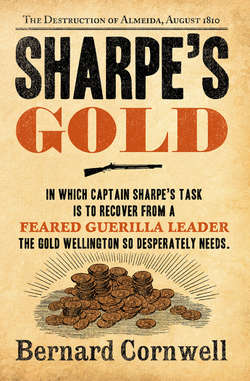Читать книгу Sharpe’s Gold: The Destruction of Almeida, August 1810 - Bernard Cornwell - Страница 14
CHAPTER SIX
ОглавлениеSharpe mocked himself. So simple. Just release the Major when two of the finest regiments in the French army were expecting a night attack. The wise course, he thought, was to go home. The French probably had the gold by now, the war was lost, and a sensible man would shoulder his rifle and think about making a living at home. Instead, like a gambler who had lost all but a handful of coins, he was staking everything on one last throw, a throw against odds of sixteen to one.
Which was not, he told himself as the Company filed down a goat track in the darkness, quite true. He had lain on the gully’s rim as the sun westered and watched the French preparations. They were thorough, but in their defence was their weakness, and Sharpe had felt the excitement well up inside, the incipient knowledge of success. The French expected an attack by Partisans, by small groups of silent men who would carry knives, or else who would fire muskets from the darkness, and they had prepared themselves for that ordeal. The village did not help them. The houses either side of the narrow street were jostled by low, ragged outbuildings; the whole making a maze of alleyways and dark corners where a silent assassin held the advantage. The French had no outlying sentries. To put a small group of men out in the fields was to write their death sentence, and the French, accustomed to this kind of fighting, had drawn themselves into makeshift fortresses. Most of the cavalry were in Cesar Moreno’s house with its ample stabling and high, encircling wall. The other fortress, the only other building with a wall high and strong enough, was the hermitage with its cemetery. Both buildings would be crowded, but both safe from the silent knives, and to make them safer the French had embarked on a crusade of systematic destruction. The cottages nearest the Moreno house had been flattened, the ringing of the big hammers on their stone walls carrying up into the gully, and every tree, every door, every stick of furniture, had been cut and splintered and piled into heaps that could be lit so an attacking Partisan would be denied the gift of darkness. The French held the advantage, but only against Partisans. In their wildest dreams they would not imagine the sudden appearance of British infantry, crossbelts vivid in the defensive firelight, muskets flaming disciplined death. Or so Sharpe hoped.
He had one other advantage, slight but important. Kearsey had obviously given his parole, his gentleman’s promise, to his captors that he would not attempt to escape, and Sharpe had seen the small Major limping round the village. Each time, Kearsey had gone back to Moreno’s house, and finally, as the light faded, Sharpe had seen the Major sitting on a balcony, on one of the few pieces of furniture left, so at least the rescuers knew where their goal lay. All that remained was to break into the house and for that speed was vital.
